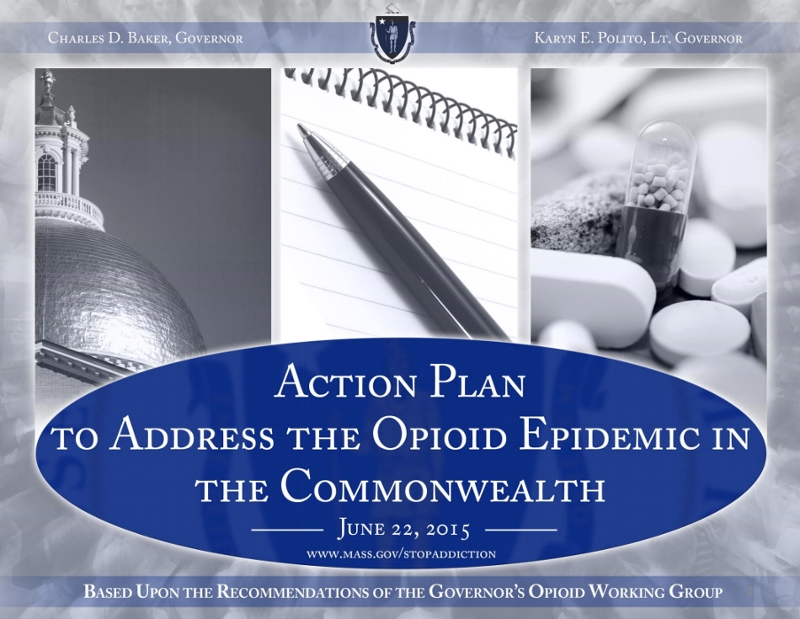by Bethany Romano

In response to a growing epidemic of prescription drug abuse and overdose, on June 22 Massachusetts Governor Charlie Baker released findings from his 18-person Opioid Working Group. The group’s report includes a comprehensive plan of over 65 short- and long-term action items to be implemented statewide over the next three years.
Among the recommendations, the report includes several that focus on improving the Massachusetts prescription drug monitoring program. Prescription drug monitoring programs (PDMPs) are state-level databases that doctors and pharmacists consult prior to prescribing or dispensing controlled substances, such as addictive painkillers. Now present in 49 states, PDMPs have become an increasingly important tool for preventing prescription drug abuse.
On behalf of his colleagues at Heller’s PDMP Center of Excellence, Clearinghouse Manager Tom Clark provided Heller Communications with some initial reactions and additional recommendations to Massachusetts’ ground-breaking new initiative.
Initial Reactions to the Massachusetts Opioid Working Group’s Report
The working group report and Governor Charlie Baker’s action plan are welcome responses to the prescription drug abuse epidemic in Massachusetts. They contain many important recommendations that should be implemented rapidly in order to save lives that will otherwise be lost to addiction in the coming months. Several states, including Washington and Kentucky, have undertaken similarly broad initiatives involving multiple stakeholders, which could inform efforts in Massachusetts. Both of these states have seen a recent drop in in overdose deaths, which is attributed to efforts to improve controlled substance prescribing, expand the use of the prescription drug monitoring program (PDMP), and shut down “pill mills.”
Additional Recommendations
Below are some additional recommendations aimed at improving prescribing guidelines, encouraging providers to refer patients to addiction and/or pain treatment, making opioid addiction treatment safe and available, and enhancing the PDMP to make more effective use of its data.
1. Prescribing guidelines. The Massachusetts medical community should research, adopt and promote controlled substance prescribing guidelines that states such as Washington have adopted. A consensus is emerging on best practices for safe opioid prescribing and alternative therapies for treating pain. State and national medical organizations have developed several sets of guidelines that could serve as models for Massachusetts. PDMP data can be used to measure progress in prescriber uptake and adherence to these guidelines. It is important not to ignore the role of stimulants and sedatives, as well as opioids, in addiction, overdose and death.
2. Maintain continuity of care. Physicians should be strongly discouraged from instantly firing patients from their practices upon discovery of drug misuse. Rather, they should make every effort to maintain continuity of care for patients found to be addicted or using controlled substances non-medically, including expedited entry into substance use disorder treatment and/or pain treatment. Discovery of substance misuse should trigger a coordinated response by all providers treating the patient.
3. Expand medication-assisted treatment. Medication-assisted treatment (MAT) should be considered the standard of care for opioid addiction. Abstinence-based treatment increases the risk of overdose and death, since patients who taper off all opioids have tolerance at pre-addiction levels, making a relapse potentially deadly. Those taking buprenorphine or methadone (to treat opioid or heroin addiction) are better protected against overdose by having higher opioid tolerance. The stigma against MAT among abstinence-based treatment providers and the public should be included in the educational campaign against stigmatizing addiction.
4. Increase buprenorphine availability. Make buprenorphine (Suboxone) treatment widely available, as it is in emergency departments, primary care, and prisons, for those who would otherwise seek out illicit opioids to manage withdrawal. Suboxone is safe, not readily abused and relatively inexpensive. State law should supersede any nationally-imposed restrictions on the dispensing of buprenorphine.
5. Making the most of the Massachusetts PDMP
Note: Some of the following recommendations are already being implemented in Massachusetts, but could be strengthened. When available, links to relevant reports from the PDMP Center of Excellence are provided.
- Promote and enforce a strong, unconditional mandate for prescribers to use PDMP data when prescribing controlled substances in certain circumstances, following the examples of Kentucky and New York. Center of Excellence briefing on prescriber mandates.
- To help prescribers fulfill the mandate requirements, expedite the implementation of delegate accounts to access PDMP data.
- Expand electronic unsolicited reporting to include patients having multiple overlapping prescriptions, exceeding daily dose greater than 120 MME for non-cancer pain, and being prescribed opioids continuously for more than 30 days for non-cancer pain. Maine has recently implemented additional criteria for unsolicited reporting. Center of Excellence guidance on unsolicited reporting.
- Issue “report cards” to prescribers that show how their prescribing compares to norms for their specialty. Include information on prescribing guidelines. Arizona is pioneering this approach. Center of Excellence briefing on interventions with possible at-risk providers.
- Issue alerts to prescribers when their prescribing significantly exceeds the norm for their specialty or if they continue to prescribe to patients whose prescriptions exceed known risk thresholds. Include information on prescribing guidelines.
- After consultation with the patient care team, the Department of Public Health should consider initiating direct contact with patients who continue to meet risk thresholds despite multiple alerts to prescribers. Center of Excellence Notes from the Field on Nevada’s pre-criminal intervention program.
- In collaboration with medical boards and law enforcement, use PDMP data to identify possible at-risk prescribers for further investigation and possible intervention. Center of Excellence briefing on interventions with possible at-risk prescribers.
- Allow and encourage third-party payers, public and private, to access PDMP data in order to have the complete picture of their enrollees’ prescription history. Center of Excellence third-party payer report, Center of Excellence briefing on Washington State’s PDMP data-sharing initiative with Medicaid and worker’s compensation.
